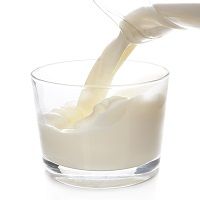Kids with Asthma Who Are Allergic to Milk Should Still Receive Immunotherapy
Although asthma increases the risk of anaphylaxis in children with milk allergies and reduces the chance that immunotherapy will prove fully successful, study results show that the majority of patients who undergo immunotherapy for a milk allergy can achieve a protective dose.

Although asthma increases the risk of anaphylaxis in children with milk allergies and reduces the chance that immunotherapy will prove fully successful, study results show that the majority of patients who undergo immunotherapy for a milk allergy can achieve a protective dose.
Most asthmatic patients, however, can probably develop enough tolerance to consume limited amounts of milk protein each day and those who do achieve full desensitization can consume milk freely after treatment.
Researchers recruited 194 children, age 6 and over, with IgE-mediated allergies to cow’s milk and compared immunotherapy outcomes for the 101 patients who also had asthma and the 93 who did not. Those that had asthma suffered more reactions — and more severe reactions — to smaller amounts of cow’s milk throughout the experiment, but the authors of the study concluded that oral immunotherapy still made sense for kids with asthma.
“Despite the more difficult course, most patients with asthma managed to reach a dose that would likely protect them from subsequent accidental exposures,” they wrote in the Annals of Allergy, Asthma & Immunology.
“Although severe reactions requiring epinephrine were still observed [even in asthmatic patients who reach full desensitization], in most cases they subsided with time. Baseline asthma severity does not seem to affect the risk of severe reactions at random exposure and during the course of [oral immunotherapy], but patients with intermittent asthma have a more favorable outcome.”
Accidental exposure had been a significant problem, both for patients with and without asthma, before they begun immunotherapy. Indeed, 84.2% of the asthmatic patients and 64.5% of the others had suffered milk-induced anaphylaxis before the study began.
Asthmatic patients tended to develop significantly larger wheals than non-asthmatic patients in reaction to initial skin prick tests (8.3mm vs. 7.1mm; p=0.002). They also tolerated much smaller milk doses than non-asthmatic patients when therapy began (231mg vs. 665mg; p<0.001).
During the course of treatment, asthmatic patients required an average of 1.5 doses of epinephrine to treat allergic reactions sustained from oral immunotherapy in the lab and at home. Patients with no allergies, on the other hand, required an average of 0.5 epinephrine doses apiece (p<0.001).
Asthmatic patients were nearly as likely as non-asthmatic patients to reach partial desensitization to their milk allergies (86.1% vs. 88.2%), but their average tolerance for milk protein at the end of immunotherapy was significantly lower than the tolerance of non-asthmatic patients (781mg vs. 1,165mg).
Asthmatic patients were also less likely than non-asthmatic patients to reach full desensitization (51.5% vs. 68.8%; p=0.019).
The large number of asthmatic patients in the study allowed the research team to conduct subgroup analysis that explored how the severity of a patient’s asthma affected the oral immunotherapy (OIT) process.
“Two main findings emerge from this analysis,” they wrote.
“The first is that the risk for adverse reactions at accidental exposure and during OIT is independent of asthma severity. This means that even patients considered to have mild asthma, who do not require daily controller therapy, are at a significant risk for severe reactions at accidental exposure. Patients and physicians should be aware of this higher risk. In addition, OIT programs should take into account that patients with even mild asthma are at increased risk for severe reactions during OIT.
“The second finding is that asthma severity affects the outcome of OIT. Significantly more patients with intermittent asthma achieved full desensitization at the end of OIT and maintained a state of desensitization months later while consuming CMP daily.”